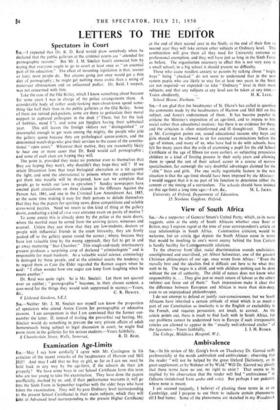View of South Africa
SIR,—As a supporter of General Smuts's United Party, which, as its name suggests, aims at the unity of South Africans whether once Boer or Briton, may I express regret at the tone of your correspondent's article on race relationships in South Africa. Constructive criticism, would be welcome, but an article Witt depicts the South African scene in terms that would be insulting to one's worst enemy behind the Iron Curtain is hardly healthy for Comrepnwealth relations.
To the observer from- afar, racial discrimination sounds unchristian, unenlightened and uncivilised, yet Albert Schweitzer, one of the greatest Christian philosophers of our age, once wrote from Africa : "Even the morally best and the idealists find it difficult out here to be what they wish to be. The negro is a child, and with children nothing can be done without the use of authority. The child of nature does not know what responsibility is.... They give just so much return of labour as the others (whites) can force out of them." Such impressions make it clear that the difference between European and African is more than skin-deep,
even to an unprejudiced philanthropist. . • I do not attempt to defend or justify race-consciousness, but we South Africans have inherited a certain attitude of mind which is as much a part of our Constitution as insularity is to the English or excitability to the French, and requires persuasion, not insult, to correct. As the article points out, there is much to find fault with in South Africa, but our problems cannot be understood here in Europe if such irresponsible articles are allowed to appear in the " usually well-informed circles" of the Spectator.—Yours faithfully, J. J. H. RYMER. The College, Middlesex Hospital, W.I.


































 Previous page
Previous page